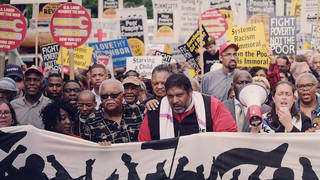
By Amy Goodman and Denis Moynihan
Dr. Armen Henderson is a physician and associate professor of medicine at the University of Miami. In addition to his clinical work, Dr. Henderson volunteers, administering COVID-19 tests to people experiencing homelessness in Miami. Last Friday, Henderson, who is African American, was at home loading a van with tents and other supplies to distribute to unhoused people, when a Miami Police cruiser pulled up. The officer got out, accusing Henderson of littering, and handcuffed him.
Dr. Henderson had been wearing a surgical mask for protection from the novel coronavirus, which came off during the encounter. “He was like inches from my face, yelling that I should call him sergeant and sir, and with no mask or gloves on,” Henderson told us on the Democracy Now! news hour. “I could feel his saliva on my lips.”
He went on, “While he was in my face, I pretty much kept quiet, just waiting for my wife to come. Once she came outside…he said, ‘I’m going to need to see some ID.’ She got her ID, showed him that we actually lived here, and at that point, he pretty much let me go.”
Henderson’s home security camera recorded the exchange, and, even without audio, the video went viral, provoking widespread outrage. Within 24 hours, Miami Police Chief Jorge Colina had announced an internal investigation.
When asked why he focuses on the unhoused population, Dr. Henderson replied, “We have to shelter in place, to socially distance. For someone unsheltered, it’s impossible to do those things. In a pandemic, these are the most vulnerable individuals, who we’re supposed to be paying the most attention to…individuals that sleep on buses, on bus stops, on benches. When you’re talking about a public health response to a pandemic, you have to focus on those who are using the public spaces the most.” He added, “It’s been hard to get testing…if you’re not a rich person.”
Most of Henderson’s volunteer work is in Miami’s historically African-American Overtown neighborhood, which, decades ago, he explained, “was a burgeoning black community, like the Harlem of the South.” Overtown was later eviscerated by construction of Interstate 95, leaving a gutted community beset by poverty and drug addiction. Just a few miles away lies one of the country’s wealthiest zip codes, Miami’s Fisher Island, a private enclave, home to about 800 families, accessible only by boat or helicopter. There, where the average annual income was $2.5 million in 2015, everyone has access to a rapid response COVID-19 antibody test, purchased for them by Fisher Island from the University of Miami Health System.
Class and race distinctions in who COVID-19 kills are becoming increasingly glaring. People from poor communities and communities of color are more likely to have underlying health issues compounded by less access to quality healthcare. “The life expectancy of people who live in Overtown is 15 years less, in comparison to Fisher Island,” Dr. Henderson said. “It speaks to the hypocrisy of the system in general.”
These disparities are stark, and global. Oxfam America released a report last week, “Dignity Not Destitution: An 'Economic Rescue Plan For All' to tackle the Coronavirus crisis and rebuild a more equal world.” Oxfam estimates that COVID-19, if unchecked, could kill as many 40 million people globally, and push as many as 600 million more people into poverty, leaving half of the world’s 7.8 billion people impoverished.
This report comes as President Trump announced that the United States would be withholding funds from the World Health Organization, the UN agency leading the global pandemic response. The editor-in-chief of the esteemed medical journal The Lancet called the move “a crime against humanity.” Oxfam’s Paul O’Brien, speaking on Democracy Now!, called Trump’s decision “nothing other than short-term blame shifting and scapegoating in order to distract people from the failures of this administration to properly lead on the issue. Its consequences could be devastating.”
In the face of the enormity of the pandemic, individual acts of courage and compassion abound. Mutual aid is springing from grassroots, immigrant and youth groups, unions, congregations, and indigenous organizations. While none of these efforts is a substitute for globally-coordinated, government-funded action, they are making real differences, providing critical support and saving lives.
Dr. Armen Henderson, speaking about the police officer who handcuffed him on his way to provide COVID-19 testing to Miami’s homeless, said, “I want him held accountable, and I want an apology.” Undeterred, he continues to work in Overtown, deploying a new test which will return results in just 15 minutes, an improvement over the 4- to 10-day turnaround time of the previous test. Let’s hope his work proceeds unfettered, and the only thing restrained is Trump’s calamitous response to this punishing pandemic.












Media Options